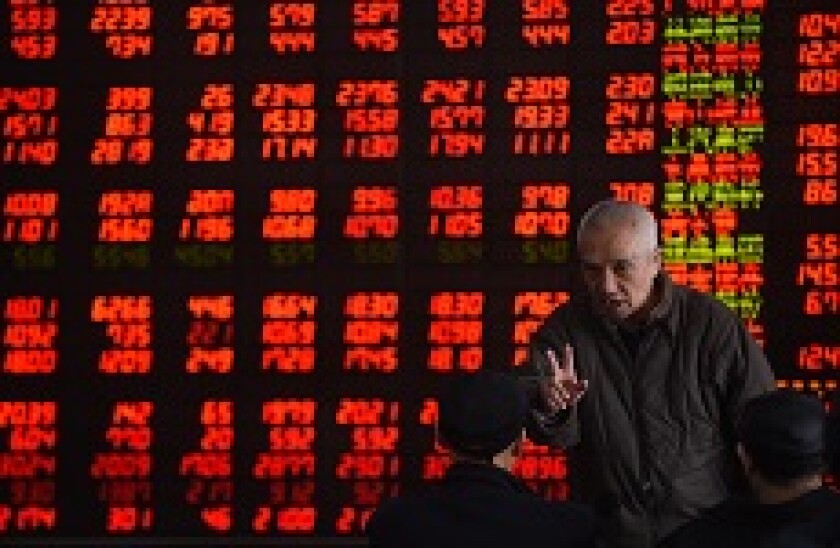The CSI300 index rose by 5.9% on Monday, experiencing its largest daily percentage rise in three years. Total trading turnover reached Rmb1.04tr ($160bn), also the highest level in more than three years.
While most analysts attributed the price rise to the positive outcome of trade talks between China and the United States — particularly US president Donald Trump saying he would delay raising tariffs — others argued that the more important factor is that the China Banking and Insurance Regulatory Commission (CBIRC) declared that the government’s “deleveraging campaign has reached its goal” during a press release on Monday afternoon.
That statement appears misleading. In the same press conference, Wang Zhaoxing, vice chairman of CBIRC, said that there was much work left to do.
*
China’s service imports and exports rose 11.5% to Rmb5.24tr in 2018, the Ministry of Commerce said on Tuesday.
The country will attempt to expand service exports, boost service consumption and deepen poverty reduction through developing the household service industry, said the ministry.
*
Bloomberg conducted a poll among Hong Kong and Singaporean investors. According to the poll, published on Thursday, around 67% of the 180 survey respondents plan to invest in Chinese onshore bonds in 2019. Only 8% said they would sell their Chinese onshore bond holdings.
The upcoming inclusion of Chinese government bonds and policy bank bonds in the Bloomberg Barclays Global Aggregate Index, and the low correlation between the performance of Chinese onshore bonds and those of the developed markets, are the top two reasons for those planning to invest in Chinese bonds.
For those not as optimistic, the most cited reasons are credit risk and liquidity issues. Among all participants, Singaporean investors are more concerned with issues such as trading hours, taxation and language barriers, the survey found.
*
China’s official manufacturing PMI fell to 49.2 in February, the lowest since January 2017, Thursday data from the National Bureau of Statistics (NBS) shows. Non-manufacturing PMI also slowed from 54.7 in January to 54.3.
Manufacturing PMI went up for large manufacturing enterprises but declined for small and medium sized ones.
“According to the NBS, transportation, telecom and bank-related service activities remained strong while property and household service activities slowed in February,” Maggie Wei, an economist at Goldman Sachs, wrote in a Thursday note. “Construction activities slowed in February due to holiday and also adverse weather effect.”
“Trade indicators fell meaningfully – the imports sub-index went down to 44.8 from 47.1, and the new export order sub-index was at 45.2 vs 46.9 in January,” Wei added.
*
The unofficial Caixin manufacturing PMI was published on Friday morning. Contrary to the declines in the NBS numbers, Caixin manufacturing PMI rose to 49.9 in February from 48.3 in January.
“Although the enterprises sampled in the Caixin PMI are generally smaller than those sampled in the official PMI, this is also inconsistent with February’s sharp declines in the sub-indices for small and medium-sized enterprises under the official PMI,” Ting Lu, China economist at Nomura, wrote in a Friday morning note.
“Despite the rise in the Caixin PMI in February, we maintain our view that growth momentum is losing steam, as implied by the lower Caixin and official PMIs in January-February,” he added.
The Caixin production sub-index increased to 50.2 from 48.1 in February. The new order sub-index rose to 50.2 from 47.3, and the new export orders sub-index fell from 50.4 to 49.4.
Maggie Wei from Goldman Sachs was more optimistic.
“In general, we believe Caixin manufacturing PMI showed some early signs of better growth momentum in the manufacturing sector in February,” Wei wrote. “However, the floating holiday and continued weakness shown in other indicators such as NBS manufacturing PMI added uncertainties to the above view, and for the period of January to February … growth momentum still likely softened from late last year.”
*
The renminbi retained its status as the fifth most used payments currency globally in January, according to Swift’s monthly RMB tracker.
It had a share of 2.15% in global payments by value, up from December’s 2.07%, above the Canadian dollar’s 1.74%.
Hong Kong still maintained its position as the largest offshore RMB clearing centre, accounting for 77.28% of all RMB payments outside China, down from December’s 79.05%.
In terms of FX transactions value, UK led the pack, accounting for 36.68% of total FX transactions, with Hong Kong and United States lagging behind, accounting for 29.18% and 7.94%, respectively.

